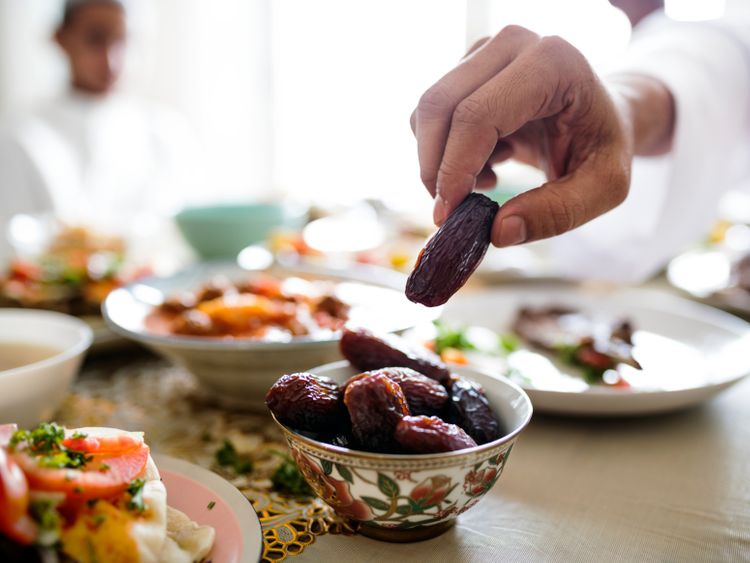While they are staple part of the diet throughout the year, dates gain increased prominence in the UAE during Ramadan.
The nutritious fruits are not only the start to most worshippers’ iftar meals but also a part of many desserts traditionally prepared during the holy month.
But why are they such an indispensable part of Ramadan food?
Emulation prophetic practice
Not only do they grow widely in the region, with the UAE alone producing 160 varieties of the fruit, but its consumption also emulates the practice of the Prophet Muhammad (peace be upon him).
“Dates were one of Prophet Muhammad’s favourite and most desired food items. It is customary in many countries for Muslims to break their fast at the time of iftar by consuming dates as it is [considered to be a] blessed practice based on the [example] of Prophet Muhammad,” said Dr Nisar Ahmed Bathoolunnisa, manager of dietetics at the Sheikh Shakhbout Medical City (SSMC).
So while it is not mandatory to start the iftar with dates, it is preferred practice. Prophet Muhammad would reportedly start his iftar with three dates and water.
Nutritional benefits
There are also additional nutritious benefits of consuming dates.
“In addition to their great taste, dates contain protein, vitamins and minerals. When consumed in moderation, dates can also contribute essential nutrients, such as potassium, magnesium, iron and manganese. They are also high in polyphenols, which are antioxidant compounds that protect the body from inflammation; dates contain more polyphenols that most other fruits and vegetables,” Dr Bathoolunnisa explained.
Sugar replacement
In addition, the fruit can act as a substitute for empty-calorie sweets, and dates can therefore be a natural sugar replacement in desserts.
“Dates can satisfy a person’s sweet tooth while also providing essential nutrients, such as vitamin B-6 and iron. They are also high in fibre, which helps people feel full for longer,” Dr Bathoolunnisa said.
Recommended types
Given their importance in the Middle Eastern diet, there are not only a wide variety of dates available in the UAE but also many different forms of the main date. However, the raw and dried forms are the healthiest, rather than dates preserved in sugar, dates stuffed with nuts and other fillings, chocolate-coated dates, date pastes, date balls and date-based desserts.
The fruit can be eaten by people of all ages, including babies aged seven to eight months old onwards.
Portions for diabetics
In addition, it is also safe for diabetics when eaten in moderation.
“People with diabetes should be mindful of their total sugar intake when consuming dates. But eating dates in moderation is unlikely to raise a person’s blood sugar excessively. According to a study published in the Nutrition Journal in 2011 by researchers at the UAE University, dates were found to have a low glycemic index, which means that they do not result in significant increases in blood sugar in people with or without diabetes,” Bathoolunnisa said.
“People with diabetes can likely eat a serving of two to three natural dates at a time but it also recommended to seek the advice of a dietitian. On the other hand, a 100-gram serving, or a handful of dates per day, is the optimal intake for people who do not have diabetes,” she advised.
For reference, three unsweetened dates are equivalent to one portion of fruit, and they contain 70 calories.
Who should eat dates
Because of its myriad benefits, the fruit is recommended for more than just the fasting Muslim.
“Muslims rub softened dates on the lips of a newborn, as demonstrated by Prophet Muhammad, and this has been shown to help prevent hypoglycaemia and pain. They are also healthy and safe during pregnancy, and are also recommended for the elderly because they prevent constipation, anaemia and other micronutrient deficiencies,” Dr Bathoolunnisa said.
Source: Gulf News






